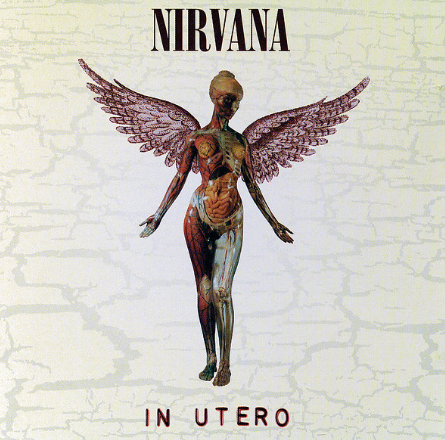As the face of the grunge movement during the ‘90s, Nirvana stands as a distinguished name in not just the grunge and rock community, but also the universe of music in its entirety.
The Seattle band that left their mark as a part of the “Big Four” of grunge, Nirvana has continued drawing in new listeners and sustaining fans for 34 years.
On Sept. 21, 1993 – less than a year after the release of their compilation album “Incesticide” (1992) – the band delivered an indigestible, introspective, conceptual record consisting of underlying themes of the reproductive system, family, life, death, and the individual.
Although the album displays far more controversial topics and lyrics than their previous works, many of the tracks have been featured on
the radio and MTV. Although some were featured more frequently than others, the media saw common appearances of “Dumb,” “All Apologies,” “Pennyroyal Tea,” “Serve the Servants,” “Heart-Shaped Box,” and the arguably problematic and blunt track “Rape Me.”
Despite the mixed reception, the tracks on “In Utero” have left a lasting impression, providing fans with hard-to-swallow topics that are infused with symbolism, metaphors, and blatant statements.
As done in their preceding album “Nevermind” (1991), “In Utero” includes a hidden improvised track close to eight minutes in length: “Gallons of Rubbing Alcohol Flow Through the Strip.”
For the 20th anniversary of “In Utero,” a deluxe edition was released featuring the hidden track, demos, b-sides, instrumentals, improvs, producer mixes, and a remastered version of the entire record.
Some of the standout tracks from the original album include “Radio Friendly Unit Shifter,” for mixing between vocals and instruments, the wailing on “Scentless Apprentice,” and drum expertise within “Frances Farmer Will Have Her Revenge On Seattle.”
“In Utero” has carried on through the test of critique and time, contributing yet another grunge essential album in their catalog. The band has faced mass scrutiny for their image, personas, and previous works. In retrospect, the album can be seen combating these dissections through the unembellished narratives to the criticism. “In Utero” takes on more constantly abrasive, introspective stories supported by the increasingly aggressive and assertive musicianship that Nirvana established while in the studio.
Borderlining the title of a concept album, “In Utero” stands as a work with individual songs that piece together to form a purpose that is larger than life, remaining a pivotal era for Nirvana, in the gunge community, and ultimately in today’s music and style.

(Flickr)















